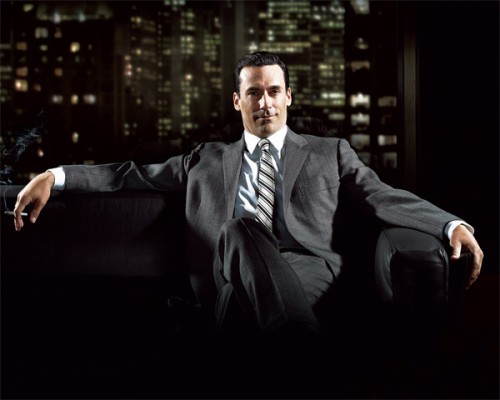
There is much more to learn from suave salesmen Don Draper than we think.
Draper’s first delightful sales secret is being proactive rather than reactive. Eastman Kodak wants a campaign for their slide projector based on the wheel. From my many years as a sales executive, I’d say most sales reps would merely react: dutifully providing a wheel and merely satisfying the client. But Draper takes it a huge step further. He transcends expectations. While always respectful, he resists the temptation to become trapped in the box of his client’s initial spec. Instead Draper creatively leaps out of the box, aims past the target of base requirements, adds value and dramatically differentiates his product from all his wheel-based competition.
While granting that technology is a “glittering lure,” he introduces nostalgia and boldly insists that the slide projector “is not called the wheel. It’s called the carousel.” Draper uses creativity and a deep understanding of his customer’s business to establish trust. This allows him to seize the initiative and proactively tell the customer the solution to his challenge.
Remember this: If we don’t confidently conclude every interaction with our clients with: “Based on what you’ve told me, this is what I suggest we do,” we have not taken Draper’s proactive lesson to heart.
Don Draper’s second secret for delighting customers is doing the lion’s share of the work. My old mentor and founder of the IBM Executive School, Louis Mobley, used to say, “IBM doesn’t sell drill bits. IBM sells holes!” The single biggest mistake we make in sales is reactively expecting the customer to provide the holes. When we make the client do all the research and tough thinking, we usually end up failing to delight–and without the sale. Draper doesn’t just ask his prospect, “What do you want?” Instead, like a good Trappist monk, he selflessly puts himself in his client’s shoes and asks himself “If I were Eastman Kodak’s customers, what would I want?”
Draper’s third secret is remembering the people factor. A business case is indeed a glittering lure, but very few purchase decisions are strictly rational decisions. Draper is a first-rate psychologist who has given deep and careful thought to what makes himself and other people tick. We are primarily emotional creatures, and Draper aims his presentation at the hearts of his clients, his client’s customers, and his TV audience with magical results.
Prospects are flesh-and-blood human beings longing to be moved by our sincere concern for their unspoken hope that buying our product will get them promoted, and their unspoken fear that it will get them fired. It is when we address both business and human needs that the customer is delighted.
By seizing the initiative, doing the hard work and appealing to hearts as well as heads, Draper establishes trust. The client in turn surrenders to a salesman who so obviously knows more about an aspect of his business than he does. And as viewers, like his colleague reduced to tears, we too surrender to Draper.
Whether through spirituality, a worthwhile mission or romantic love, we all long to surrender to something bigger than ourselves. Surprisingly, this applies to purchase decisions as well. We can’t possibly be knowledgeable about everything we buy. We long to surrender control to an expert we can trust to define the hole we need before providing the proper drill bit.
For myself, there is nothing more delightful than surrendering to a great New York City waiter. In lieu of a menu, he gathers information about me instead. Then he tells me exactly what I am having for dinner. He gains my trust; I surrender control and end up having a far more delightful dining experience than I could have designed for myself from an endless menu of edible drill bits.
Conversely, when I was CEO of my own company, nothing depressed me more than an endless stream of sales reps shaking my hand and handing me a menu-like brochure. Handing it back I would say, “Excuse me, but I don’t have time to learn your business and product line. We’re meeting so you can learn my business and tell me how you can help.”
In a previous article, “Business Secrets of the Trappists,” I introduced a business philosophy I call “service and selflessness” to explain how a small community of aged monks working only four hours a day in silence could be so incredibly successful in business. Service and selflessness for monks means doing business with a “prayerful attitude,” and this translates into a fanatical commitment to serving their monastic customers. Financial success just falls out from that.
The monk’s prayerful attitude is mirrored in the emerging business trend toward replacing the old paradigm of satisfying customers with the new paradigm of delighting customers. But as with all buzz words, delighting customers is usually honored more in the breach than the observance.
At the heart of service and selflessness is the ancient yet emergent truth that it is in our own self-interest to forget our self-interest. Every great salesman knows that the more he forgets himself, his product line and his commissions in order to fanatically focus on serving his customer, the more sales he makes. Commissions take care of themselves. Whether profits, unit volume or individual targets, outsized success is merely the byproduct of selflessly serving customers.
After 35 years I may be biased, but I sincerely believe that when we delight customers, sales is not just the world’s second-oldest profession, but the noblest as well. To this day, despite what else I may be, I reverentially fill in the occupation line on my IRS form each year with that simple word: “Salesman.”
The trajectory of business, economics and even civilization is a painstaking climb up the hierarchy of human needs. Delighting customers rather than merely satisfying customers is just another step on our long journey from selfishness to selflessness. However, learning to delight customers requires something more akin to what monks call a change of heart rather than a change of mind. It means consciously putting others first, over and over, until it eventually becomes instinctive, automatic and second-nature. But when this change of heart finally and irrevocably takes place, we discover it has all been well worthwhile. After all, nothing quite matches the exquisite joy of telling a slack-jawed client, “Good luck with your next meeting.”
source: Forbes
photo credit: Christina Saint Marche via photopin cc


1 comment on “Top Sales Tips From Don Draper (Mad Men)”